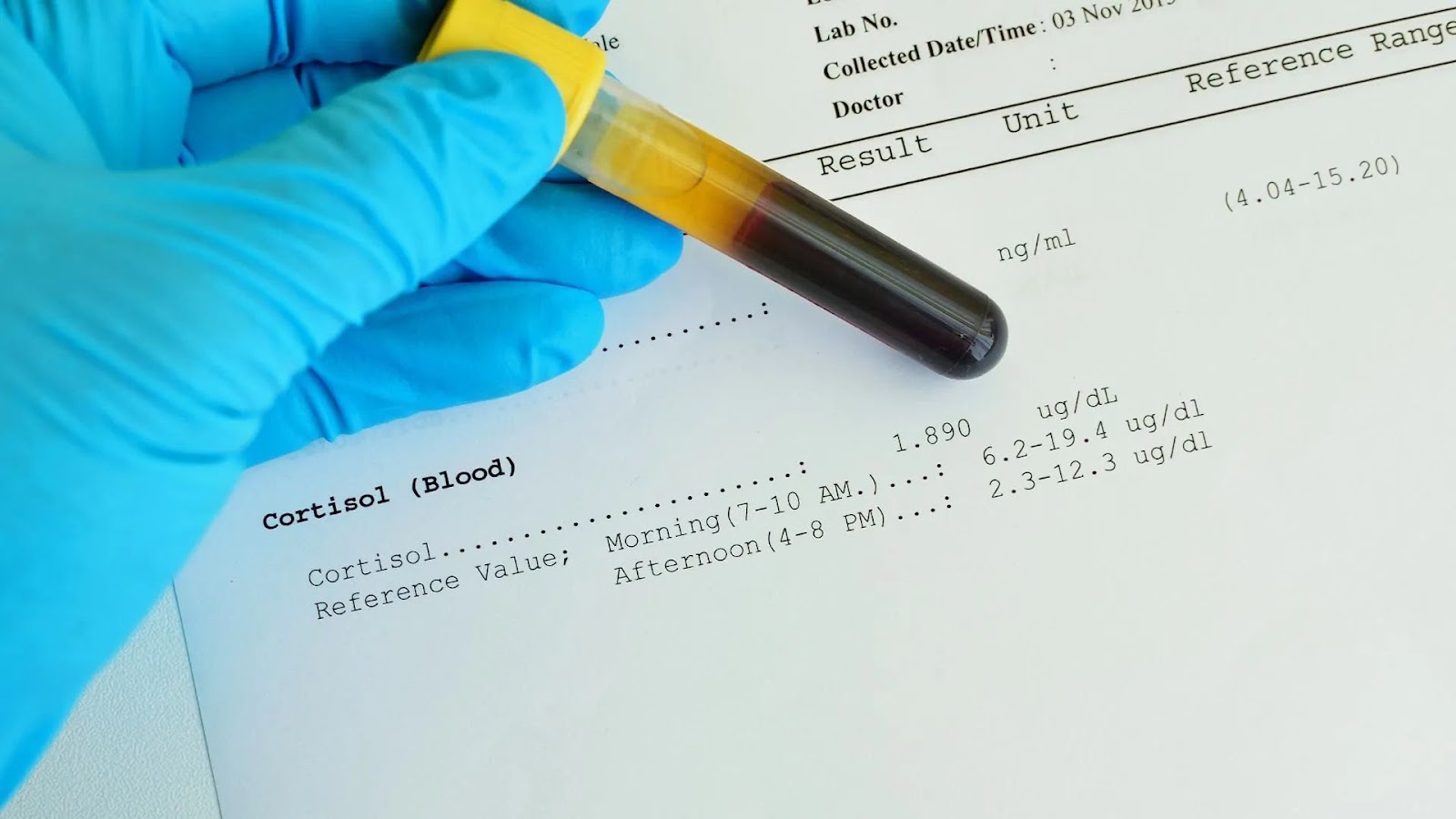Are cortisol levels too high? Why this is problematic
While a short-term increase in cortisol is completely normal, a persistently elevated cortisol level can have negative consequences. The body then remains in a kind of chronic stress mode, which is burdensome in the long run.
Especially insidious: One often does not directly feel chronically elevated cortisol. Many people get used to ongoing stress but do not realize that their body is constantly running at full speed.
Causes of elevated cortisol levels
A persistently elevated cortisol level can be triggered by various factors – both external stressors and internal physiological processes.
Physical or emotional stress
Whether it's intense workouts, lack of sleep, or emotional burdens – any type of stress activates cortisol production. Chronic stress prevents the body from adequately breaking down cortisol.
Professional or personal pressure
Constant time pressure, high responsibility, or conflicts in personal life can keep cortisol levels consistently high. Without sufficient recovery phases, the body remains in stress mode.
Excessive alcohol consumption
Alcohol affects hormone regulation and can increase cortisol release. At the same time, it burdens the liver, further deteriorating the body's ability to cope with stress.
Too much caffeine
Caffeine stimulates the sympathetic nervous system and signals the body to release cortisol – especially when consumed regularly and in high amounts.
Depression &and psychological stress
Studies show that people with depression often have elevated cortisol levels. Chronic emotional stress can permanently disrupt hormonal balance and lead to overproduction.
Hypoglycemia (low blood sugar)
A low blood sugar level signals a potential threat to the body. To provide energy, cortisol is released as it stimulates glucose production in the liver.
Hormonal Changes
Pregnancy, menopause, or diseases that affect hormone balance can also lead to an imbalance in cortisol production.
Long-term use of corticosteroid medications
Medications containing cortisone (e.g., for the treatment of inflammation or allergies) can affect the body's natural cortisol balance and inhibit or increase its own production.
Hyperfunction of the adrenal cortex (Cushing's syndrome)
In rare cases, a pathological overproduction of cortisol can be caused by a malfunction of the adrenal cortex or the pituitary gland. This leads to a persistently elevated cortisol level with serious health consequences.
The consequences
- Sleep problems
-
Rising blood sugar levels
- High blood pressure
- Overweight
- Coronary heart disease
- Cushing's syndrome
- Loss of libido
- Weakness
- Stomach problems
- Weight gain
In contrast, a chronic Cortisol deficiency causes other symptoms:
- low blood pressure
- Weight loss
- Mood swings
- Weakness attacks
Cortisol throughout the day
Cortisol follows a natural rhythm that is aligned with the body's internal clock.Its concentration in the blood fluctuates throughout the day and is strongly influenced by sleep, stress, and daily routines.
In the morning: Highest cortisol level for the perfect start
Between 6 and 9 a.m., cortisol reaches its peak. This is because the body prepares for waking up:
-
Energy is mobilized to actively start the day
-
Blood sugar rises to fuel the brain
- Alertness and attention increase
Tip: Getting plenty of daylight in the morning can help stabilize the natural cortisol rhythm. Here’s the ideal morning routine.
During the day: fluctuations depending on activity
Throughout the day, cortisol levels gradually decrease. However, depending on how stressful daily life is, short-term cortisol spikes can occur – for example, during meetings, intense workouts, or time pressure.
Those who experience a lot of stress during the day repeatedly produce cortisol – this can lead to an imbalanced hormone level in the long term.

High stress in daily life and at work reduces the immune system's ability to respond to threats.
In the evening: cortisol drops to its lowest point
By midnight, cortisol reaches its lowest value. Now, regeneration is in the foreground:
Cells are being repaired
The body prepares for sleep
Relaxation and recovery begin
Tip: Blue light from screens and late caffeine can artificially keep cortisol levels high – it's better to avoid digital devices two hours before going to bed. Here is the ideal sleep routine.
Why a stable cortisol rhythm is important
A healthy cortisol course is crucial for performance, well-being, and sleep quality.People with chronic stress often experience unnatural fluctuations:
-
Consistently high cortisol levels → Can lead to sleep disturbances, weight gain, and burnout
-
Too low cortisol levels → Can cause fatigue, lack of drive, and concentration problems
Measuring cortisol levels: How meaningful is it?
If you suspect that your cortisol levels are too high or too low, you can have them tested medically. However, a single measurement is not sufficient, as cortisol fluctuates significantly throughout the day. To obtain a meaningful result, the daily course of cortisol must be recorded and a so-called cortisol daily profile created.
How can cortisol be measured?
There are various methods to determine cortisol levels:
Blood test:
- Measures total cortisol in the blood (bound &and free)
- Meaningful for a moment, but not for the daily course
Urine or saliva test:
-
Captures the free, biologically active cortisol
- Multiple measurements throughout the day possible to analyze the rhythm
-
Especially helpful in case of suspicion of imbalances throughout the day
Important: The saliva measurement is practical, but there are no standardized reference values, which can make interpretation difficult.
When is a cortisol measurement useful?
A test can be helpful if symptoms such as persistent exhaustion, sleep disturbances, unexplained weight gain, or concentration problems are present. Also, if there is suspicion of adrenal insufficiency or excessive stress, regular measurement can provide insights.
Anyone who wants to test their cortisol levels should measure it throughout the day in most cases to consider the natural rhythm. Individual values are not very informative.
 Cortisol can be measured in blood serum (shown here), urine, and saliva. The normal values vary depending on the time of day.
Cortisol can be measured in blood serum (shown here), urine, and saliva. The normal values vary depending on the time of day.
Lowering cortisol levels: Practical tips
A persistently elevated cortisol level can negatively affect your health – from sleep disturbances to a weakened immune system. The good news: There are numerous simple methods that can positively influence your cortisol level.
Actively reduce stress
Chronic stress is one of the biggest drivers of cortisol.To get your body out of the “fight or flight” mode, targeted relaxation techniques can help:
-
Breathing exercises &and mindfulness training – have been shown to lower cortisol levels
-
Walks in nature – naturally reduce stress hormones
-
Power naps &and rest breaks – help the body to regenerate
Tip: Regular mindful breaks in everyday life can effectively regulate cortisol.
Healthy sleep for a stable cortisol level
Since cortisol follows a circadian rhythm, sleep is essential for its regulation. Those who sleep too little or irregularly risk persistently high cortisol levels.
-
Maintain regular sleep times – for a stable internal clock
-
Avoid blue light – keep at least one hour away from your phone and computer in the evening before going to bed to avoid disrupting natural cortisol reduction
-
Sleep duration of 7–9 hours – promotes recovery and lowers cortisol
Tip: A dark, cool bedroom can improve sleep quality and thus cortisol balance.
Nutrition & manage caffeine wisely
Your diet also influences your cortisol levels.
This can lower cortisol:
This can increase cortisol:
- Too much caffeine – stimulates the stress hormone system
- Alcohol &and highly processed foods – additionally burden the body
- Long periods of hunger – can cause cortisol levels to rise
Tip: If you are sensitive to caffeine, try to avoid it in the afternoon or evening to keep your cortisol levels from rising unnecessarily.
Movement – but in the right dose
Exercise can help lower cortisol – but only if it is done in moderation.
Moderate training (e.g., yoga, swimming, walking) → sustainably lowers cortisol
Intensive training (e.g., excessive cardio, HIIT) without recovery → can significantly increase cortisol in the short term
Tip: Ensure adequate recovery after training to keep cortisol levels stable.




































